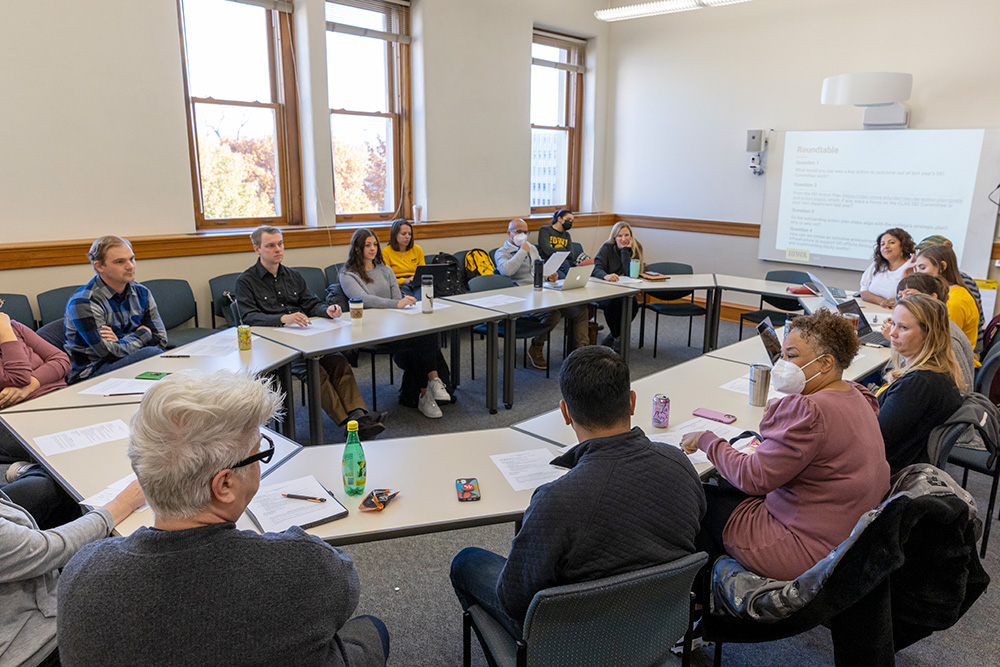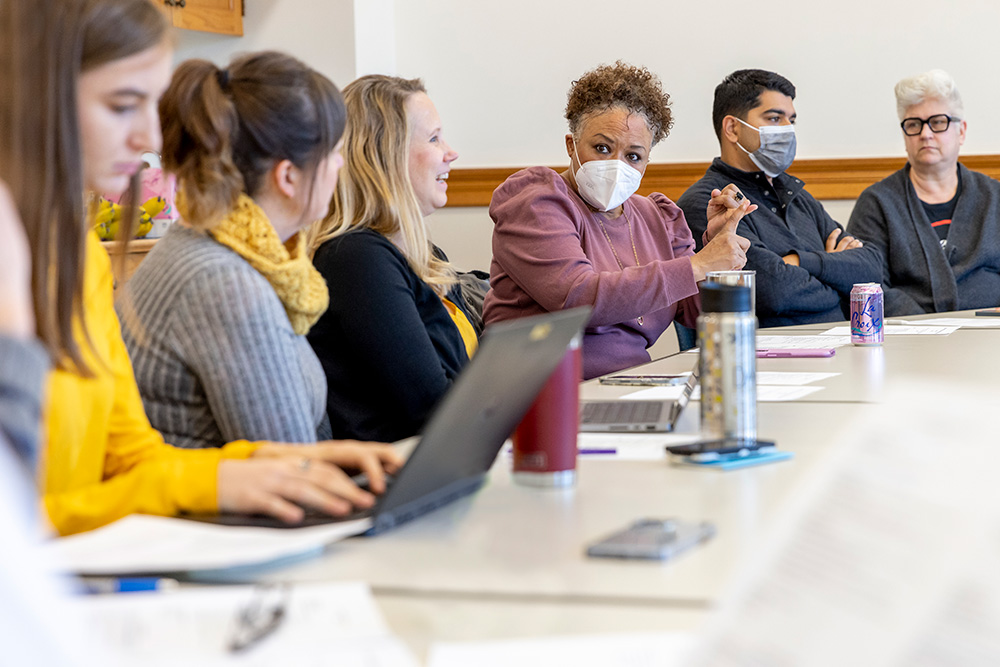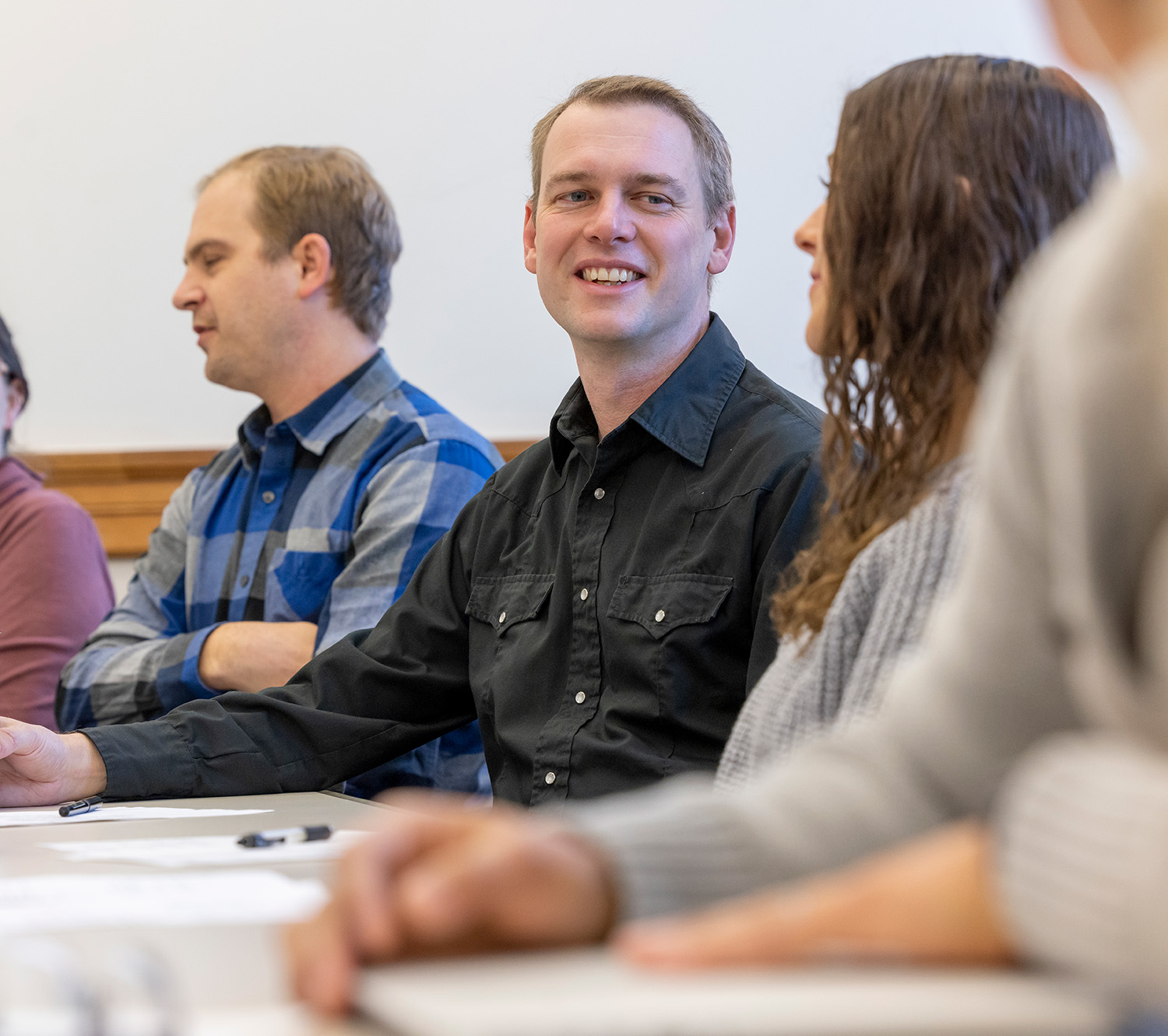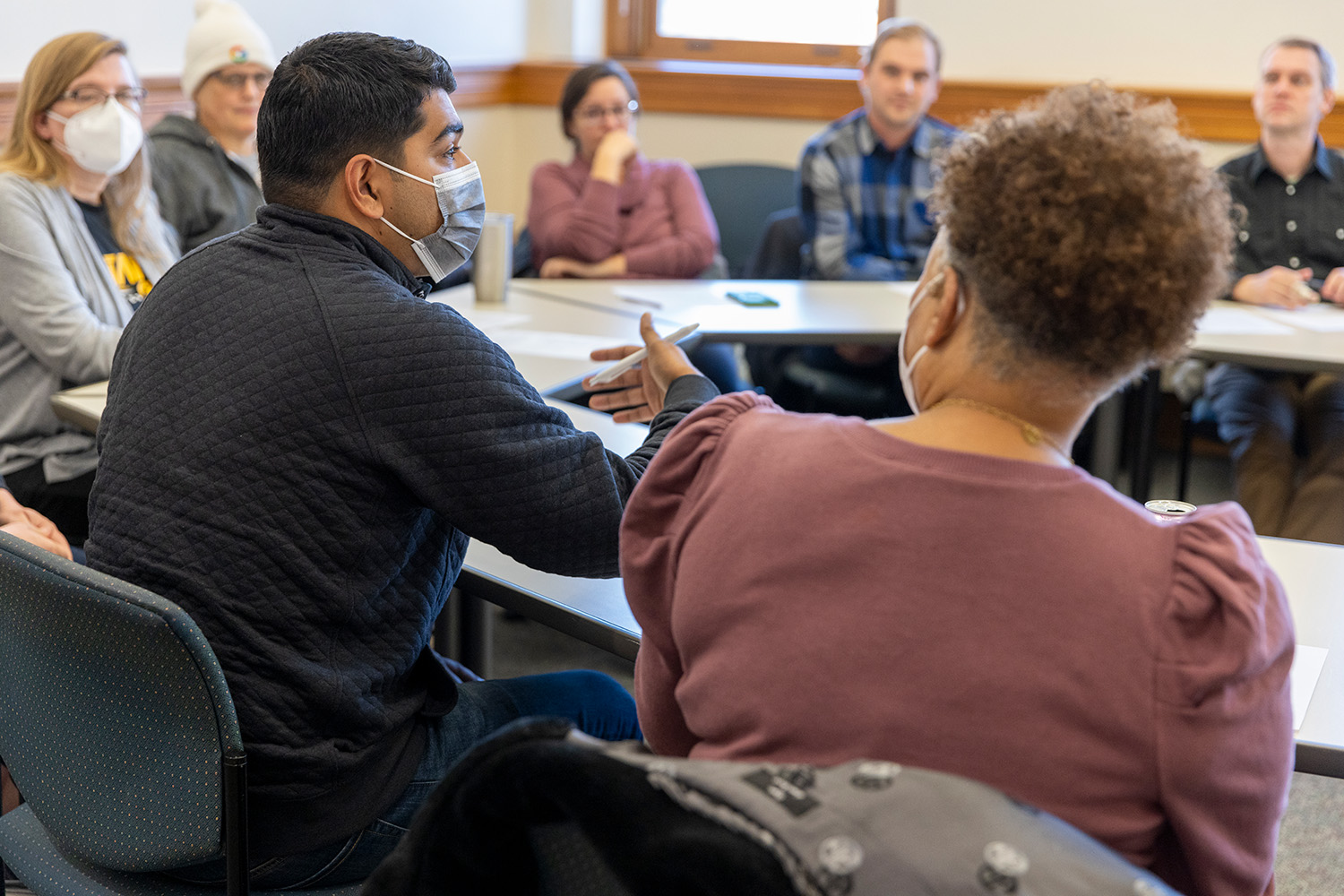The CLAS DEI Committee is charged with advancing college priorities around diversity, equity, and inclusion issues. The group met in November to reflect on the work so far, where it is now, and how it will continue going forward.
The University of Iowa College of Liberal Arts and Sciences is committed to improving student and employee experience around diversity, equity, and inclusion. In that mission, in 2015, the college’s DEI committee consisting of faculty, staff, and students was formed. It now works to help push forward goals laid out in the college’s strategic and DEI action plan.
In late fall, the group convened with new and returning members to reflect on its progress so far and to consider the group’s path and priorities for the college’s DEI work going forward. Using a roundtable approach, committee members discussed how the CLAS strategic plan aligns with the current action steps. The following were key themes that reflect this process.
What have we done?
The committee agreed it has made progress on several key actions over the last year, including data collection and resource allocation. That information is now being used to understand the college's current state and practices with DEI. “By and large we have a baseline to compare and look for progress or lack-there-of, so that was one of the big things we did over the last year,” Mark Fullenkamp, CLAS Staff Council president said.
Work was also completed to survey departmental executive officers (DEOs) to understand their visions for DEI and how it is currently integrated into each department’s work, as well as an understanding of how each unit handles mentoring.
Another important action was the addition of a full-time DEI director, in the hiring of Liz Mendez-Shannon in August 2022. Her position is focused on developing DEI initiatives and facilitating the advisory committee's work.
Committee representatives say they had been balancing DEI work in addition to their full-time workload, which can be a barrier to progress without anyone fully focused on these efforts. “We’ve seen from the data that the changes have been small even though we’ve been trying so hard,” Jen Knights, CLAS Staff Council DEI committee chair explained. “But now we have a dedicated person to lead, and that is such a critical element.”
The group’s commitment to including other perspectives was prominent throughout the discussion. For example, committee member and Communication Studies graduate student Andrew Boge shared the success of establishing a student advisory group as integral to the process.
Representatives from individual departments also provided some examples of individual progress in their areas, namely efforts related to mentoring as well as recruiting and retaining a diverse workforce.

Where are we now?
The DEI Strategic Plan centers on two goals—to promote an inclusive environment and to build stronger infrastructure to support DEI efforts, with a focus on climate and retention, as well as building community support in the college. Retention and belonging continue to be challenges, according to committee members, and it is felt by faculty, staff, and students.
Programs have been put in place to help with recruiting and hiring diverse faculty members, including Path to Distinction, which offers a toolkit with training, worksheets, and best practices for faculty search committees. However, the CLAS DEI committee agrees more can be done to keep diverse faculty members at Iowa. “We need to put our money where our mouth is and go the extra mile to retain [newly recruited faculty], and I don’t see that happening all the time. We lack the substance to achieve our [retention] goals,” Christine Rutledge-Russell, committee and School of Music faculty member said.
Goals around recruitment and retention should include staff, too, according to some members. “We are a predominantly white institution and our resources for increasing diversity go beyond faculty. We have a community of lots of brown and Black people, people with disabilities, and diverse identities—we need to be looking at local staff recruitment and not just recruiting faculty from the national scale,” Knights said.
The classroom environment presents challenges both in curriculum and teacher support—this can be especially difficult for instructors of color who are evaluated by majority white students through a process that can be prone to bias. “There is a push to teach marginalized perspectives and I feel an obligation to try and incorporate those voices into my classroom,” Boge, a TA of color, explained. “But then when I get a racist review because a white student feels targeted by me—there are no resources, no one reaches out to me to say that’s problematic.”
That lack of support circles back to recruitment and retention again. “Why would I come here if I’m going to be laid out to dry every semester in terms of evaluations?” Caroline Clay, a committee and Theatre Arts faculty member of color, added. Committee members agreed that belonging is measured by value—how do we value our community members? Why should I work here?
Since then, based on a recommendation by DEI committee and Dean’s Office staff member, Gabbie McDermott, Clay met with Cornelia Lang, associate dean for undergraduate education, who shared ongoing initiatives to help improve the tenure-track evaluation process, which includes considering gender, race, culture, identity, and communication styles and also solidifying departmental training and mentorships provided for early career BIPOC (Black, Indigenous, and people of color) hires, particularly practitioners transitioning into academia who may not have as much classroom experience. Clay says this was all heartening to hear, and she hopes that this information is consolidated in a way that BIPOC hires can feel the effect of these intentional measures.
Instructors can also feel a tension between grading and inclusivity, trying to be welcoming to students, while also evaluating them. “It’s so much easier for a student, especially if they are from an under-represented background, first gen, to fall through the cracks if they aren’t seen, and it’s just easier to see someone if they are in a class of 18 instead of a lecture room of one-hundred,” committee member and Rhetoric faculty member Dylan Nice said.
Retention and belonging continue to be a focus for committee members.
Where are we going?
The committee decided to extend its goals and action steps into 2026 in alignment with the college’s strategic plan and will address topics of mentoring across the college, equity audits in policy and procedures, and creating a DEI toolkit for instructors. This work will be done in small working groups.
Members agreed that goals and outcomes needed to be more specific and scalable—so they can be used and customized for departments and units across the college. “The original action plan has so many good things, but they aren’t concrete enough,” McDermott said. “Hopefully, with having these three areas that we are really focusing on as a committee . . . we can take steps forward in and that they are very specific—and that’s exciting for the committee to be leading in that way for the college.”
But they also need to be measurable. “We could rework these goals and action steps to have targets that are specific so next year we could say our goal was to double the number of X, and how did we do relative to that metric,” committee member and Mathematics and Computer Science faculty member Denise Szecsei said.
It’s not just about metrics for members. The words that are used to communicate priorities and goals are important, too. “Frankly, DEI, it sounds really nice, but those terms often intentionally circulate in corporate, institutional spaces because they don’t really have any teeth to them. Honestly—it starts with language but also with allocating resources,” Boge said.
DEI work is not a one-and-done, nor is it a checklist. The group agreed—it is just getting started.


